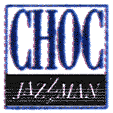Bye-Ya
(Steve Lacy)
Recorded in 1996
Bye-Ya |
|
(Steve Lacy) |
|
|
Recorded in 1996 |
| Ind. | Title | Composer / Author | Dur. |
|---|---|---|---|
| 1/ | The Hoot | Steve Lacy | 4:45 |
| 2/ | Bye-Ya | Thelonious Monk | 6:12 |
| 3/ | Longing | Steve Lacy | 8:46 |
| 4/ | The Bath | 8:54 | |
| 5/ | Pï-Pande | Jean-Jacques Avenel | 4:45 |
| 6/ | Regret | Steve Lacy / Paul Potts | 4:40 |
| 7/ | Prayer | Steve Lacy | 8:37 |
| 8/ | Trinkle Tinkle | Thelonious Monk | 6:41 |
| 9/ | Absence | Steve Lacy / Tom Raworth | 6:13 |
| 10/ | Bookioni | Steve Lacy | 4:05 |
Download free samples at emusic.com (realaudio & mp3)
Recorded on March 28 & 29, 1996 at Gimmick Studio, Yerres (France). Engineer: Hervé Le Guil; assistant engineer: Damien Bertrand. Mastered at Parélies Studio, Paris.
Producer: Jean-Paul Rodrigue, JPR Productions.
Cover photography by Christian Ducasse. Cover art: Didier Trayaud.
"For me, the trio format is a classic one, an opportunity to enjoy, and a challenge to take it further. We three have played a lot together and the studio was excellent. The overall theme is 'parting', perhaps because I've lost quite a few friends in the last few years, but also because I've left Paris for a while, after 25 years.
Three of my musical heroes were saxophonists: John Gilmore, for whom I wrote The Hoot, was the extraordinary soloist with Sun Ra's band, able to take chances and score melodically, in the most far-out circumstances. Charlie Rouse inspired Prayer. Playing together with him in Monk's band was one of my most cherished experiences. The Bath is a portrait of Dexter Gordon, with his huge tone and joyous swing.
Absence is dedicated to poet Franco Beltrametti, a dear friend of all of us, departed last summer. Irene sings the words that Tom Raworth wrote in August 1995 at Franco's funeral: Out of a sudden:
The alphabet wonders
What it should do
Paper feels useless
Colours lose hue
While all musical notes
Perform only in blue [...]"
The words of Regret are by Paul Potts:
My dreams
Watching me said
One to the other
This life has let us down."
The song is meant for Johnny Dyani, the great bassist from South Africa. We played together, in the 60's *, another early death. Jean-Jacques Avenel made the piece Pï-Pande in memory of the young guitarist, Lionel Benhamou, who died not long ago. Longing is a recent song of words by Fernando Pessoa, and Bookioni is something I took from Oliver Johnson. Of the two Monk's tunes, Trinkle Tinkle is saying 'hello', and Bye-Ya, well, what do you think?"
Steve Lacy (reprinted from sleeve notes)
* Cf. The Forest And The Zoo, recorded 1966 in Buenos Aires.
Soprano saxophonist Steve Lacy is one of the most-recorded musicians on the planet, and facing his ever-expanding discography can be daunting even for insiders. But this frisky trio date with longtime colleagues Jean-Jacques Avenel on bass and John Betsch on drums is a must-buy for Lacy freaks and a fine entry point for newcomers. The material is relatively straight-ahead, and Lacy smiles a bit more than usual. He mixes tilted but joyously swinging phrases -- his time is incredible -- with his trademark under-a-microscope, note-by-note exploring.
Mark Stryker (Excerpt from Detroit Free Press - 24/08/97)

En trio avec Jean-Jacques Avenel et John Betsch, Steve Lacy livre ici un disque très émouvant, gouverné par le souvenir d'êtres chers aujourd'hui disparus. Une émotion sourde que l'on éprouve dès la première écoute, avant même d'avoir jeté un oeil sur la pochette qui fournit des clés sous formes de dédicaces.
Irene Aebi (sollicitée sur deux titres) s'intègre avec foi dans la dramaturgie de l'album. Concentré sur la musique, son essence et son expression la plus évidente possible, le trio sert admirablement le projet artistique de Steve Lacy, qui n'est peut être jamais apparu aussi clairement que dans cet opus de bout en bout gouverné par la nécessité.
Les savants détours mélodiques, l'importance allouée à la couleur sonore de l'orchestre, l'interaction idéale entre les trois musiciens se rejoignent ici dans un espace de jeu où la liberté d'interprétation ne se laisse rien dicter.
Une oeuvre de maturité, forte et exigeante, témoin d'une vie de réflexion et de musique. A l'image de son concepteur.
Arnaud Merlin (Jazzman - Octobre 1996)
Une thématique axée sur le départ - celui d'artistes amis ou admirés : The Hoot, pour John Gilmore, Prayer, pour Charlie Rouse, Regret, pour Johnny Dyani, Pï-Pande (d'Avenel) pour Lionel Benhamou... et celui, tout récent, de Lacy pour Berlin après un quart de siècle de vie parisienne - et pas une once de morbidité.
Au contraire, un élan, un bonheur de jouer (Herve Le Guil a même capté quelques éclats de rire entre deux plages - et Dieu sait que Lacy n'a pas une réputation de boute-en-train), une sereine connivence dans la certitude que la vie (donc la musique) continue, et même avance. Certitude acquise, justement, au contact des "chers disparus" (dont Monk, via Trinkle Tinkle et Bye-Ya, reste la figure tutélaire) et qui n'empêche pas de se poser des questions fructueuses, connivence de trois hommes qui entrelacent leurs voix depuis plus de dix ans et dont la complicité - complémentarité a acquis une épaisseur - densité impressionnante, terreau de la grave légèreté de leur musique. Splendide !
Thierry Quénum (Jazz Magazine 463 - Octobre 96)